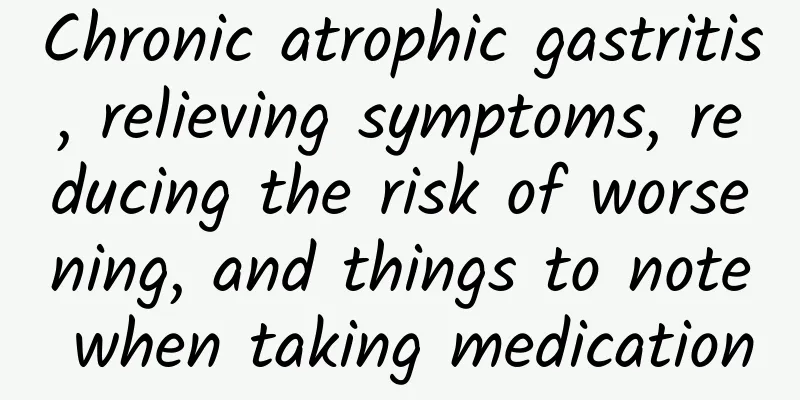Chronic atrophic gastritis, relieving symptoms, reducing the risk of worsening, and things to note when taking medication

|
A friend asked Huazi how to treat chronic atrophic gastritis, whether it can be cured, and how long should the medicine be taken? Huazi replied that chronic atrophic gastritis (CAG) is a difficult disease. The World Health Organization (WHO) classifies it as a precancerous condition. It develops slowly and the condition often lingers. Chronic atrophic gastritis is a chronic gastric disease that causes repeated damage to the gastric mucosal epithelium, leading to a decrease in intrinsic glands, and may be accompanied by intestinal metaplasia or atypical hyperplasia. At present, there is a lack of effective treatment for chronic atrophic gastritis. The treatment mainly relies on individualized medication based on symptoms to relieve symptoms and delay the progression of lesions, thereby reducing the risk of cancer. 1. Eliminate Helicobacter pylori (Hp) Helicobacter pylori infection is the most common cause of chronic atrophic gastritis. After being infected with Helicobacter pylori, it will cause long-term inflammatory stimulation to the gastric mucosa, induce an immune response, and cause gastric mucosal atrophy and intestinal metaplasia in some patients. People with chronic atrophic gastritis need to be promptly cleared of Helicobacter pylori infection if they are also infected. The Fifth National Consensus Report on the Treatment of Helicobacter pylori Infection states that eradication of Helicobacter pylori can eliminate inflammatory responses, slow down or stop the progression of atrophy, and may even reverse atrophy. The current method for eliminating Helicobacter pylori in my country is mainly "quadruple therapy", which is to use a proton pump inhibitor, a bismuth preparation, and two antibiotics to form a combination of four drugs, which are taken continuously for 14 days. The elimination rate of "quadruple therapy" is about 60%~70%. If the elimination fails, other antibiotics should be replaced at least 3 months later and treatment should be repeated. There is also research on "dual therapy" to eliminate Helicobacter pylori. The treatment idea is to choose one proton pump inhibitor and one antibiotic to form a two-drug combination regimen, also taken for 14 days. By increasing the drug dosage and administration frequency to increase the drug effect, the same therapeutic effect as "quadruple therapy" can be achieved, but with fewer adverse reactions and lower costs. The specific method and medication should be selected under the guidance of a doctor. 2. Symptomatic treatment for different symptoms Patients with chronic atrophic gastritis have different clinical symptoms and need individualized medication and symptomatic treatment based on different symptoms. 1. If there is gastric mucosal erosion, upper abdominal pain, upper abdominal burning sensation and other symptoms: gastric mucosal protectants are needed, such as aluminum carbonate magnesium, sucralfate and other drugs that can cover the mucosa to produce a protective effect, and can also absorb bile to treat gastric mucosal damage caused by bile reflux. Antacids are needed to reduce the damage of gastric acid to the gastric mucosa. Drugs that directly neutralize gastric acid, such as sodium bicarbonate and aluminum hydroxide, take effect quickly but last for a short time. Therefore, proton pump inhibitors ("prazole" drugs) are often used to keep the pH value in the stomach > 4 for 18 hours. H2 receptor inhibitors ("tidin" drugs) can also be used to keep the pH value in the stomach > 4 for 8 hours. 2. Symptoms of indigestion such as upper abdominal fullness, nausea, vomiting, etc.: Gastrokinetic drugs are needed, and commonly used drugs include domperidone, mosapride, itopride, etc. However, domperidone has a rare adverse reaction that can cause serious arrhythmias, so the latter two gastrokinetic drugs are more commonly used. 3. Symptoms of decreased digestive function such as abdominal distension and decreased appetite when eating: Digestive enzyme preparations are needed, such as pancreatic enzyme enteric-coated capsules, Aspergillus oryzae pancreatic enzymes, compound digestive enzymes, compound azintamide and other drugs, which can enhance the activity of digestive enzymes and promote digestive function. 4. Digestive tract symptoms accompanied by anxiety and depression symptoms: Long-term anxiety and depression can cause digestive tract symptoms, and long-term physical discomfort can induce anxiety and depression. Therefore, when symptomatic treatment drugs are ineffective, you can try to seek treatment from a psychologist. Using anti-anxiety drugs and antidepressant drugs under the guidance of a doctor may have unexpected effects. In summary, the treatment of chronic atrophic gastritis is mainly to relieve symptoms and reduce the risk of cancer. Helicobacter pylori infection must be cleared in time. Symptomatic treatment is carried out according to different symptoms, and the effect is usually seen in about 4 weeks. Drugs that inhibit gastric acid secretion are not recommended for long-term use, and can be discontinued after symptoms are relieved. Drugs must be used under the guidance of a doctor. If you have any questions about the use of drugs, please consult a doctor or pharmacist. I am pharmacist Huazi, welcome to follow me and share more health knowledge. |
>>: Woke up with a bald head? Don't worry! You just need to...
Recommend
Why do middle-aged women gain weight?
There are always people who have been together fo...
What should women pay attention to in dietary nutrition
There is a period of inconvenience every month fo...
Popular Science丨Steady as Mount Tai, Brisk Walking
The ankle joint plays an important role in bearin...
What is the shape of a normal gestational sac?
Everyone knows that after pregnancy, the gestatio...
What should I do if my period is delayed and my vaginal discharge increases?
Some female patients have health problems, so the...
A woman dreams of a dead acquaintance
Relatives and friends become our friends because ...
The H1N1 flu is at its peak. What are the differences between its symptoms and those of COVID-19? Will there be overlapping infections?
Recently, influenza A has entered its peak period...
How to treat mei fungus and what medicine to use
Mold is a disease that women are particularly sus...
Is it normal to have less fetal movement in the eighth month of pregnancy?
When the mother is eight months pregnant, she wil...
Can I eat hairy crabs to lose weight? How much should I eat each time?
Now is the best time to enjoy hairy crabs. Hairy ...
How to prevent stretch marks for pregnant women
Many women start to worry about developing spots ...
Will I gain weight during my period?
The thing women worry about most is gaining weigh...
Do I need to disinfect when I go out during the novel coronavirus epidemic? How do I disinfect when I go out during the epidemic?
We all know that the new coronavirus is a relativ...
Bleeding and lower abdominal pain after intercourse
We all know that sex is indispensable in marriage...
Why is my stomach bloated and my period not coming?
Every time before the menstruation is about to co...









